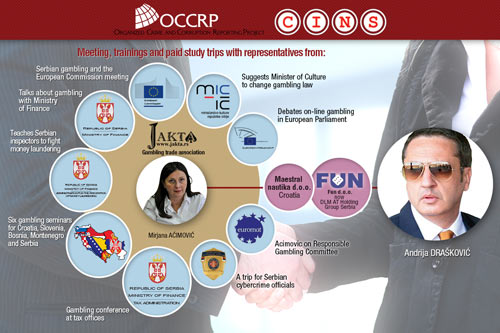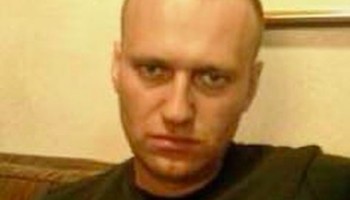Jakta, the trade group, has been aggressively working with government officials to shape gaming laws, train law enforcement officials and regulators and lobby local, regional and European governments. It has set itself up as not only a group of Serbian experts but a regional player in influencing everything related to casinos and gambling.
Mirjana Acimovic, 51, is president of the Belgrade-based Jakta (from the Latin word for “roll”, as in dice). She worked for Draskovic as far back as 1997, when he appointed her director of his company Fun d.o.o (later renamed DLM AT Holding Group) that owned two casinos and the popular downtown Havana nightclub, among others.
Draskovic is listed as the owner of Maestral Nautika d.o.o, an active trading company in Croatia, where Acimovic currently serves as director although the company has not filed any paperwork since 2008.
Acimovic said in an interview with reporters from the Center for Investigative Reporting in Serbia (CINS) and the Organized Crime and Corruption Reporting Project (OCCRP) that she no longer works with Draskovic and sees no problem with the relationship. She has had coffee with him once in 15 months, she said.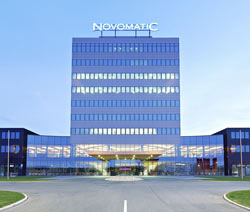 Austrian headquarters of Novomatic, one of Europe’s biggest gaming companies. Its Serbian branches are members of Jakta.
Austrian headquarters of Novomatic, one of Europe’s biggest gaming companies. Its Serbian branches are members of Jakta.
“My relationship back then with him was just professional. The man was in prison until recently and we saw each other once after he got out,” she said. “That was a private meeting and that’s irrelevant.”
Serbian authorities who worked with Jakta were asked if they were aware of the connection between Acimovic and Draskovic but none would answer specific questions.
According to the Jakta website, the organization represents 38 companies that own slot clubs, produce gambling machines or maintain them. The association is involved in writing laws with the Tax Administration, lobbying state institutions for favorable laws, helping companies get gaming permits and helping gambling addicts get treatment.
Jakta also trains police and finance officials in how to fight money-laundering and cybercrime and provides study trips to other European countries for government officials and law enforcement. Jakta leaders also regularly appear on television as expert commentators on gaming issues.
One of Jakta’s members is the Serbian branch of the Austrian gambling giant Novomatic, a €3.2 billion (US$4.3 billion) company operating in over 80 countries.
Acimovic said she is an expert and not an advisor to criminals.
“I have a diploma. … I have my name. I have my reputation behind me,” she said.
Zlatko Nikolic, a criminologist from the Institute for Criminological and Sociological Research, says it seems impossible that police officials accepting training trips would not know of such ties to organized crime. He said it is common for organized crime to try to present themselves as legal players.
"The closer you are to the state the less suspicious you are. You’re clean," he said.
Nikolic said these types of ties increase the risk of corruption.
"The problem is that when the [organizations with ties to organized crime] are meeting with state officials, those state officers are more likely to be corrupted. The state has to improve its control - from financial to security control."
Nikolic said the gambling industry attracts criminals because it's an easy way to make money, but also because it’s a good tool for laundering money.
A notorious figure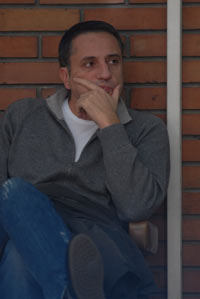 Andrija Drašković was released from jail in October 2013, after he served a sentence for murder. (photo: Blic)
Andrija Drašković was released from jail in October 2013, after he served a sentence for murder. (photo: Blic)
Draskovic is a celebrity figure in regional organized crime circles. He was indicted in Italy for his involvement in a Montenegrin cigarette smuggling scheme involving Prime Minister Milo Djukanovic, and the Italian Sacra Corona Unita and Comorra crime families.
In 2001, he was convicted of murdering crime figure Zvonko Plecic in a Belgrade restaurant and was sentenced to nine and a half years in prison. Documents show that while in prison he transferred full ownership of Fun to Acimovic; the contract shows she paid nothing.
Draskovic was released on appeal in 2004, only to be nearly killed in a hail of automatic gunfire when rival crime boss Luka Bojovic allegedly attacked his armored Jeep killing one bodyguard. According to Bojovic’s indictment, the gangster blamed Draskovic for the murder of Zeljko “Arkan” Raznatovic, a notorious mobster and paramilitary group leader involved in ethnic cleansing in Bosnia and Herzegovina during the war in the mid-1990s.
Draskovic was convicted again in the Plecic shooting at a second trial in 2010; he was finally released from jail in October of 2013.
But while the court system focused on Draskovic’s criminal activities, he was also branching out as an entrepreneur, and cycling friends and colleagues through his businesses. His close friend Todor Gardasevic, for example, served as director of Fun for two terms between 1992 and 2000, when he was shot dead by Sretko Kalinic, a rival mobster associated with Belgrade’s Zemun crime gang. Between November 2000 and December 2001, Elena Mijatovic (now Karic), Draskovic’s girlfriend at the time, served as director. She was present at the Plecic shooting in 2000 and ultimately testified for Draskovic in court.
Acimovic served intermittently as director from 1997 to 1999, and then returned to the job in 2001, following Mijatovic. Beginning in 2002, the documents show, she took over ownership from Draskovic. As owner, she expanded Fun, created a new subsidiary, and hired her husband before ultimately returning control to Draskovic in 2009.
A Friend from Jail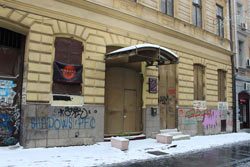 Site of Havana, the defunct nightclub owned by Andrija Drašković and the place where Jakta was originally founded. (photo: CINS)
Site of Havana, the defunct nightclub owned by Andrija Drašković and the place where Jakta was originally founded. (photo: CINS)
While Acimovic owned the company, at least on paper, Draskovic stayed involved in his former business. From prison, he signed a contract with Acimovic in March of 2003 giving his former company, without cost, 49 slot machines and other equipment worth about US$85,000 at the time.
Over the next year, Acimovic made 11 cash payments of approximately US$157,000 to the company, according to invoices obtained by CINS/OCCRP. It is not clear where the money came from or what it was for. She also spun off a branch company, the Fun Casino Slot Service, and appointed her husband, Dejan Bozovic, as director in March of 2004. He served in that position until the company was shut down in August 2013.
A second expansion came in July of 2008, after Draskovic was freed from jail pending his re-trial. Acimovic established a second company called An-Fun using real estate worth about US$1.2 million as an initial investment. Documents say the money came from an apartment owned by Fun worth about US$461,000 and land in Belgrade worth about US$746,000 at the time.
In October of 2008, Acimovic named Draskovic director of An-Fun. In December of that year, he invested a little over US$90,000 in the Fun and An-Fun companies. Documents from April of 2009 show he regained control of both companies, paying Acimovic about US$19,000, although the company had assets in real estate of at least $1.2 million. The company Fun is still active today under a new name, although the casinos are closed, while An-Fun is in the process of being liquidated.
When asked specifics about the business and transactions, Acimovic told reporters from CINS, “This interview is over. Next time when you want answers, please send all questions in writing so I can be prepared with legal counsel.”
In 2005, during Acimovic’s tenure at Fun, she founded Jakta using Fun’s offices as the legal address, where she also hired her husband and other associates from Draskovic’s companies.
Her husband, Dejan Bozovic, was named vice-president; three former Fun employees switched over to Jakta and continue to work with Jakta today. The organization moved their office to another address in July last year.
Draskovic was contacted through a relative by CINS/OCCRP but did not respond before publication.
Jakta’s membership
According to documents OCCRP/CINS obtained from the Ministry of Labor, Jakta’s membership has included Fil-Sar and Lutrija Filnik, companies controlled respectively by Montenegrin crime boss Brano Saranovic before his death in 2009 and his brother, Slobodan, who was arrested last year in connection with a murder of Luka Bojovic’s brother.
Fil-Sar controlled one casino and two slot clubs while Lutrija Filnik owned at least one casino. All have since closed.
Another Jakta member is linked to the former Belgrade-based Surcin organized crime gang which was involved in drug dealing, murder, racketeering and money laundering, according to police. Lucky Line produces gambling machines and is half owned by the wife of businessman Milan Narancic (known as Lemon), who police say is a former Surcin clan member.
Another member controls the Aleksandar slot club, owned by controversial businessman Milorad Majkic, who survived a murder attempt in 1987 and a machine gun attack on his slot club in 1998.
Acimovic said she is not responsible for her members. She notes they are already vetted by law enforcement and they couldn’t get licenses if they were financial criminals.
“You become a member of Jakta when you give a statement that you are respecting the current laws of games of chance. We are not an interrogating body so we cannot know what our members are doing in their private time,” Acimovic said.
Expanding influence into Europe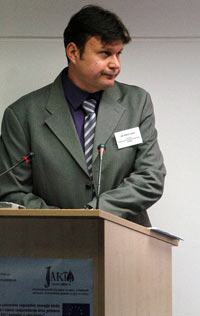 Zoran Jadžić, the former head of the state Game of Chance Administration, who helped Jakta to build its reputation. (photo: facebook)
Zoran Jadžić, the former head of the state Game of Chance Administration, who helped Jakta to build its reputation. (photo: facebook)
Since Acimovic founded Jakta, she has used an association with Serbia’s gaming regulator Zoran Jadzic to gain a higher profile in neighboring countries.
Jadzic was the head of the Game of Chance Administration within the Ministry of Finance until May of 2011, when he resigned in the wake of the police operation called Amphitheater which led to indictment of six of his officers for taking bribes from casino operators. Jadzic was not charged but resigned and took a lower-ranking job in the tax office.
Prior to his resignation, his agency worked closely with Jakta to organize events including training seminars for gambling officials from various countries. He gave space inside his agency for Jakta to organize its first big event in September 2010 where Jadzic himself gave the opening remarks.
During Jadzic’s time, Jakta regularly used the agency’s name to gain legitimacy and get officials from other countries to attend their conferences.
The Jakta website said the association organized six seminars, starting in 2010, for participants from state gaming regulators in Croatia, Slovenia, Bosnia and Herzegovina and Montenegro. Officials from the first three countries confirmed to CINS/OCCRP that they had sent people to four seminars each between 2010 and 2013, noting they paid their own expenses.
While Montenegro officials declined to comment, CINS/OCCRP obtained a letter from the regulator there thanking Jakta for its assistance.
In the spring of 2012, Aleksandar Vulovic, the new director of the Games of Chance Administration, cut close ties with Jakta. CINS/OCCRP obtained a letter from the agency to Jakta telling them not to communicate with officials of other countries on behalf of the state agency.
“The Games of Chance Administration is … the only one responsible for organizing official … meetings with other regulators in the region. … We believe that our obligation is to dissociate from the mentioned [Jakta event]. Other regulators in the region who were invited by Jakta to The Fourth Regulatory Conference will be notified about the position of our Administration,” the letter says.
Aleksandar Vulovic would not comment on the agency actions under his predecessor but said that since his arrival everything has been done according to the law. Jadzic refused to comment for the story.
Acimovic has maintained other contacts, however. She accepted an invitation in March 2013, together with her husband, by the tax administration to be members of a group that wrote amendments to the law on games of chance.
Police Trainings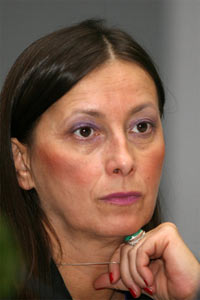 Mirjana Acimovic, the head of Jakta and associate of Andrija Drašković. (photo: facebook)
Mirjana Acimovic, the head of Jakta and associate of Andrija Drašković. (photo: facebook)
Acimovic has since expanded her work to other institutions in the last two years – including the Serbian Police’s Department for Cybercrime and the Administration for the Prevention of Money Laundering (APML). Jakta’s website says that in 2013 it organized trainings for agents of APML and sent members of the cybercrime unit to Austria for training with Novomatic.
Milan Milovanovic, director of the APML, said the claim was only “partly true,” in that it was a meeting rather than a training seminar.
He said that APML sent four employees to the meeting with Jakta to learn more about problems in gambling industry.
“Cooperation at this point is informal” said Milovanovic. “… we assume that cooperation between APML and this association [Jakta] will be continued mainly in order to protect the interests of the Republic of Serbia, gambling operators and players.”
Milovanovic told CINS/OCCRP that one representative of the Ministry of Interior attended the meeting.
Serbian police confirmed to CINS/OCCRP that four inspectors from the Department for cybercrime where sent to trainings in Novomatic and that all costs were paid by Jakta. They admitted they were not aware who provided the funding for the trip.
Novomatic operates 29 casinos in Serbia through the companies Admira and Beo Gaming, which are also members of Jakta. Novomatic has not responded to repeated requests for comment.
Trying to climb the ladder in Europe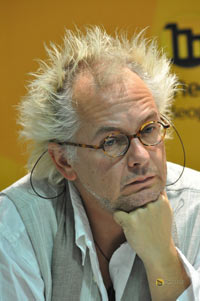 Ivan Tasovac, Minister of Culture, helped Jakta by passing the organization’s recommendations on to other ministries.
Ivan Tasovac, Minister of Culture, helped Jakta by passing the organization’s recommendations on to other ministries.
Acimovic has also been appointed chairwoman of the Responsible Gaming Committee in Euromat, the European Gaming and Amusement Federation that represents the industry at the EU level.
According to the Jakta website, Acimovic met in October 2013 with representatives of the European Commission, where, she discussed the gambling industry in Serbia and Euromat’s projects for responsible gambling.
Acimovic also says on the website that in June of 2012, she participated in a debate in the European Parliament on online gambling in Europe, and posted a video of the event. The site also says Jakta plans to implement study trips and activities in Germany, Belgium, the Netherlands and Romania.
Jakta’s effectiveness at influencing policy was demonstrated in late 2013 after Acimovic met with Minister of Culture Ivan Tasovac. She made numerous suggestions for technical amendments to gaming laws and regulations. Most of Jakta’s recommendations were passed on by Tasovac without change to the Ministry of Finance as his ideas. No action has been taken yet on these proposed changes.




